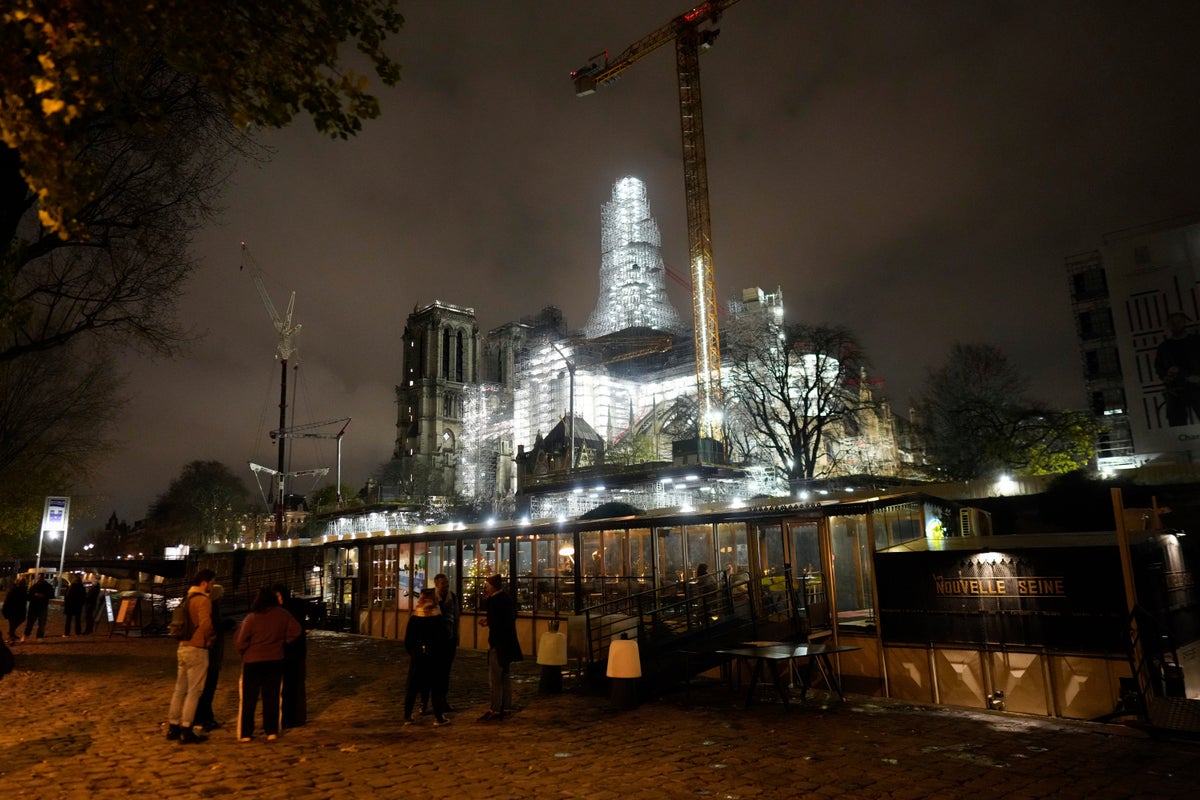
When flames tore into Notre Dame in 2019, people who worked in the cathedral felt orphaned. But as the world-famous Paris landmark's reopening draws closer, they are beginning to picture their return to the place they call home and are impatient to breathe life back into its repaired stonework and vast spaces.
The restoration of Notre Dame hits a milestone Friday: one year until the cathedral reopens its huge doors to the public, on Dec. 8, 2024. French President Emmanuel Macron will don a hard hat and tour the fenced-off reconstruction site where stonemasons, carpenters and hundreds of other artisans are hammering away to meet the 12-month deadline.
When their job is done, they will hand over to Notre Dame's priests, employees, chorists and worshippers. With prayers, songs and devotion, they'll give the cathedral the kiss of life and celebration to nudge aside the pain the April 15, 2019, blaze inflicted on French hearts and Catholic faithful around the world.
Notre Dame is “not the biggest cathedral nor perhaps the most beautiful," the Rev. Olivier Ribadeau Dumas, its rector, told The Associated Press this week, but “it is the incarnation of a nation’s soul.”
“The expectations, the preparations for the reopening are a magnificent sign of hope in a difficult world,” he said.
Henri Chalet, the principal choir conductor, already has butterflies at the thought. On one hand, he tells himself that in the 850-plus-year history of Notre Dame, its closure is just a blip and he needs to be patient a little longer. But for a human lifetime, “five years is very long,” he said, and “unfortunately, in 850 years, it fell on us."
“We are obviously impatient to be able to go back,” he said. "It really is our home, in the sense that we were there every evening for services and also for concerts every week.
“Now, we really feel there is light at the end of the tunnel," he said, "with a lot of joy, enthusiasm and a little stress.”
On the reconstruction side, recent progress has been remarkable. Huge oak beams, put together using carpentry techniques pioneered when Notre Dame was built in medieval times, have been hoisted skyward so the cathedral can be re-roofed. The towering spire now points once more toward the heavens, rebuilt piece by piece behind 600 tons of scaffolding.
When Macron visits, the name of the retired French general who led the big-budget restoration before his death will be carved in tribute in the wood of the spire. Jean-Louis Georgelin died in August, at 74.
And when Olympic visitors descend on Paris in their millions for the Summer Games opening July 26, the rebuilt spire and roof should be complete, giving the cathedral a finished look from outside.
Work inside will continue. Jobs in the final months will include tuning the cathedral's thunderous 8,000-pipe grand organ, France’s largest musical instrument. It survived the fire but had to be dismantled, cleaned of toxic lead dust generated when the roofing burned, and reassembled. Renovations will continue after the reopening.
The cathedral's own workforce also is being scaled back up. It was cut to seven employees because of closure for repairs. Dumas, the rector, said a hiring drive next year will restore the number of full-time employees to nearly 50, to welcome back the 15 million annual visitors and worshippers the Paris diocese is bracing for.
Chorist Adrielle Domerg, who was 10 when she joined Notre Dame's choirs and is now 17, said the cathedral is “almost a person” to her.
“A multitude of people, of dreams, of prayers gave birth to it," said Domerg, who last sang there with her choir days before the blaze and aches to do so again.
“It's going to be very emotional,” she said. “The cathedral, in a way, will reawaken and we will pull it out of the shadows.”







